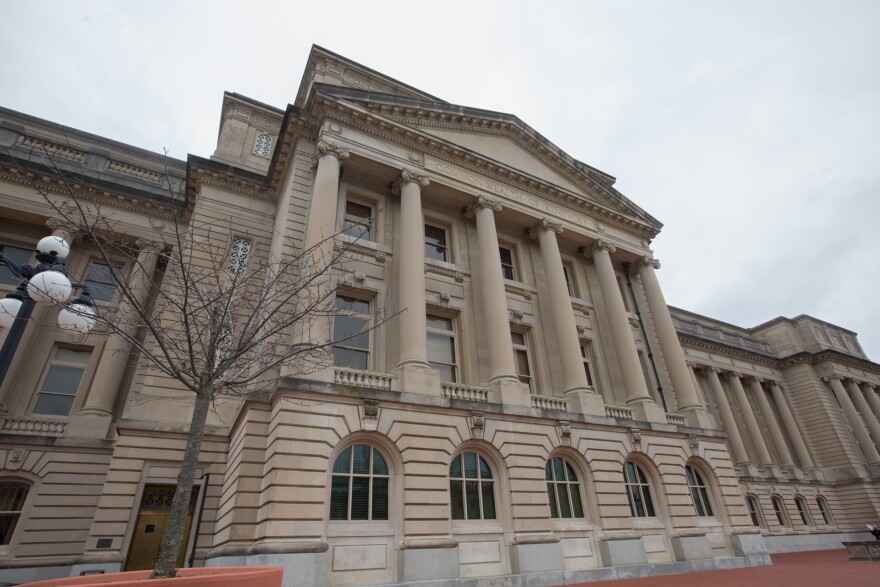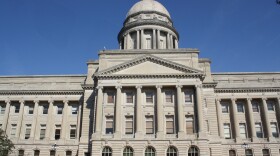The Kentucky House Education committee advanced a measure Tuesday that would enshrine into state law the First Amendment rights of public school staff to engage in “private religious expression” while on the job.
“It was a sad day in America when the Bible was taken out of schools,” bill sponsor Republican Rep. Chris Fugate of Chavies told the committee. The U.S. Supreme Court ruled in 1962 that public schools cannot hold prayer, even if participation is not required.
However, in the 2022 Kennedy v. Bremerton School District decision, the majority of the nation’s highest court ruled in favor of a high school football coach in Washington state who was fired for refusing to stop his ritual of praying on the 50-yard line after each game, joined by any who wished.
Fugate said his legislation, House Bill 547, is meant to “embolden those Christian teachers who are not ashamed of their faith, but sometimes out of fear do not say anything about their faith or hold prayer meetings with other teachers.”
The measure, which is cosponsored by more than half of the 100 members in the Republican-dominated House, would add state protections for public school employees’ right to engage in “private religious expression otherwise protected by the First Amendment … absent a showing that the employee has engaged in actual coercion.”
Specifically, the bill would protect employees who want to:
- Engage in religious expression and discussion
- Share religious material with other employees
- Meet with other district employees for prayer or religious study on breaks or before or after school
- Sponsor a student religious club
- Wear religious clothing, symbols and jewelry
- Decorate their desk and other personal spaces with items that reflect their religious beliefs
All Republican members of the committee supported the measure, joined by one Democrat, Rep. Josie Raymond of Louisville.
“I believe all people should be able to bring their whole selves to work,” Raymond said, explaining her “yes” vote.
Social studies teacher Donnie Wilkerson came in from Jamestown to speak in support of the bill. Wilkerson said his fifth grade class is beginning a unit on the U.S. Constitution.
“So we love the First Amendment. And I'm happy to see that my Christian friends now will be able to proudly display the Ten Commandments on their desk if they so choose…that our Muslim friends would be able to display their Quran,” Wilkerson said.
And, Wilkerson added, he hopes passage of the measure would allow his Unitarian Universalist friends to mark their desks as “Trans safe” zones. The UUA has taken a stance in support of LGBTQ rights.
“I think this bill will codify and affirm all of those things, and consequently will help negate some of the homophobic, gender-phobic and even racist rhetoric that appears in so many of the other bills,” he said.
Two of the committee’s three Democrats who were present voted against the measure, on the grounds that the bill is “redundant” to rights already codified in the First Amendment.
“I guess I just have too much respect for the U.S. Constitution and for the Kentucky Constitution that we're sworn to uphold to think that we need to shore it up with a state law,” Louisville Democratic Rep. Lisa Willner said.
Kate Miller, a spokesperson for the ACLU of Kentucky, said her organization had concerns about “pretty dramatic inconsistencies” between the rights outlined in the bill and the specific rights at issue in the majority opinion in the 2022 U.S. Supreme Court decision.
“From our reading of this bill, it’s much more expansive in terms of the religiosity that can be displayed by agents of the state than what was held in the Kennedy decision” Miller told LPM News. She was unable to provide additional detail, but said the ACLU was working on some proposed changes to bring the measure in line with their reading of the federal ruling.
She also said the ACLU has concerns that a coach or teacher promoting their own religion may infringe on the First Amendment rights of students who do not hold those views, and could ostracize students from minority religions.
The measure passed 15-2 and heads next to the House floor.





